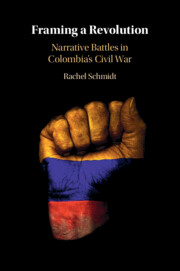Book contents
- Framing a Revolution
- Framing a Revolution
- Copyright page
- Dedication
- Epigraph
- Contents
- Figures
- Tables
- Preface
- Acknowledgments
- Abbreviations
- I What’s in a Frame?
- II A History of (Gendered) Violence in Colombia
- III Navigating Disarmament, Demobilization, and Reintegration in Colombia
- IV Framing Victimhood
- V Contesting the Victimhood Frame
- VI Framing a Revolution
- VII Countering the Revolution Frame
- VIII Deserters versus Loyalists
- IX Contesting the Deserter Frame
- X Framing Reintegration
- Book part
- Bibliography
- Index
IV - Framing Victimhood
Published online by Cambridge University Press: 02 March 2023
- Framing a Revolution
- Framing a Revolution
- Copyright page
- Dedication
- Epigraph
- Contents
- Figures
- Tables
- Preface
- Acknowledgments
- Abbreviations
- I What’s in a Frame?
- II A History of (Gendered) Violence in Colombia
- III Navigating Disarmament, Demobilization, and Reintegration in Colombia
- IV Framing Victimhood
- V Contesting the Victimhood Frame
- VI Framing a Revolution
- VII Countering the Revolution Frame
- VIII Deserters versus Loyalists
- IX Contesting the Deserter Frame
- X Framing Reintegration
- Book part
- Bibliography
- Index
Summary
This chapter introduces the first framing contest under examination in the book: victims versus perpetrators. The chapter starts with the story of Diana, who joined the FARC to escape abusive stepbrothers, only to fall into an abusive relationship with a commander, whom she later fled. Diana never enrolled in a government reintegration program, and after the peace process, she was welcomed back into the FARC reintegration in order to receive benefits. However, she did not stay long, soon leaving to take her chances in Bogotá, where she could be anonymous and not expose her children to what she saw as toxic rhetoric in the FARC camp. This chapter examines three key components that build resonance in the guerrillas’ victimhood frame: the campesino identity, gendered victimhood, and the concept of self-defense. Using supporting quotes and stories from the other 112 interviews, this chapter examines in detail the guerrilla frame of victimhood in Colombia, illustrating how collective victimhood works as a cohesive force to keep members inside the group and is especially effective at convincing women that they have nowhere else to go.
- Type
- Chapter
- Information
- Framing a RevolutionNarrative Battles in Colombia's Civil War, pp. 102 - 125Publisher: Cambridge University PressPrint publication year: 2023



